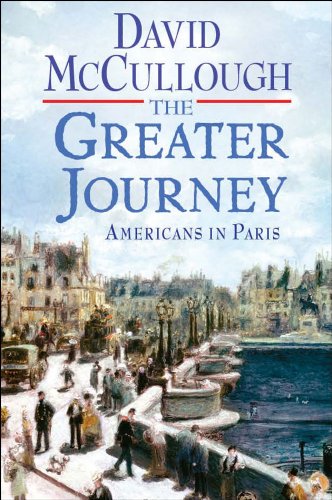
Library Director’s Notebook
September, 2012
When we think of Americans in Paris, we are most likely to recall the Americans who flocked to Paris in the 1920’s like Hemingway or Fitzgerald; or perhaps we think of American troops liberating Paris to the cheers of ecstatic crowds; or maybe we even think of Gene Kelly and Leslie Caron in the classic ballet from the award winning film An American in Paris. What most of us are not likely to think of is the steady flow of eager and earnest Americans who came to study, enjoy, explore and grow as artists, scientists, doctors, and diplomats during the nineteenth rather than the twentieth century, particularly from the 1830’s to 1900.
In his book The Greater Journey: Americans in Paris, David McCullough explores the rich personal triumphs and tragedies of those Americans who left their very young country, busy with its westward expansion, economic growth, and its unique experiments in democracy, to learn what they could from the older more accomplished traditions and discoveries of Europe, and in particular, of Paris.
Because this is a book by renown and highly respected historian David McCullough, you can be certain every major, and many minor personages, including those of iconic proportions will be treated with respect that never borders on sycophancy and will come to life as flawed, fascinating, and very human individuals.
In The Greater Journey we learn of the family life of Mary Cassatt, the friendship between James Fenimore Cooper and Samuel Morse, the medical studies of Elizabeth Blackwell and Oliver Wendell Holmes, the literary life of Henry James, and the epiphany of Charles Sumner that would shape his lifelong abolitionist fervor. Mark Twain, Ralph Waldo Emerson, John Singer Sargent and a host of famous and not so famous painters, sculptors, musicians, physicians, statesmen, and just plain tramps and tourists rubbed shoulders with the great, the royal, the rebel, and with each other in Paris in the nineteenth century. Except in the case of the most resistant or indifferent, Paris changed the lives and the thinking of thousands of Americans who brought back new ideas, dreams, and ambitions that helped shape America for decades to come.
The Parisian architecture we all take for granted, included the Arc de Triumph and the Eiffel Tower were conceived and built during the nineteenth century, as hoards of Americans came to admire and appreciate, and only rarely to criticize. Political upheaval, revolution, and civil violence seemed not to shake the doughty Americans from their determination to learn from their experiences and work in Paris and return to America, the better for it. America, welcoming back its sons and daughters, was certainly made better for it as well.
The Greater Journey is wonderfully readable, exhaustively researched, literate non-fiction for lovers of history, biography, travel, or just lovers of well written, engrossing books.




